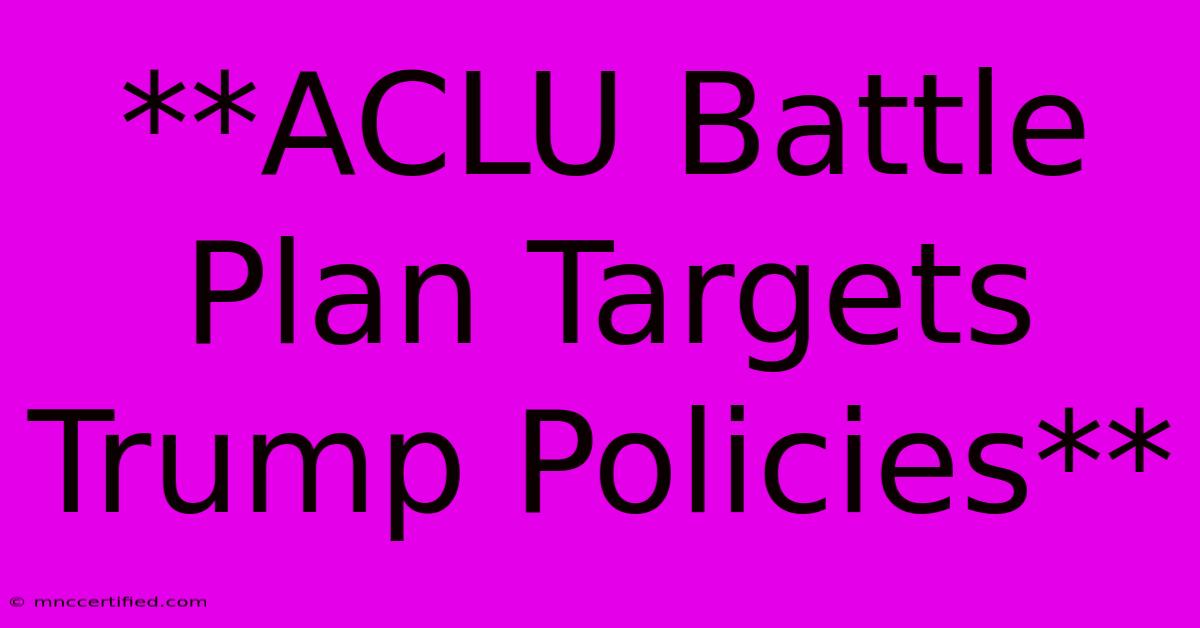**ACLU Battle Plan Targets Trump Policies**

Table of Contents
ACLU Battle Plan Targets Trump Policies: A Fight for Civil Liberties
The American Civil Liberties Union (ACLU), a non-profit organization dedicated to protecting civil liberties, has launched a comprehensive battle plan to challenge numerous policies enacted by the Trump administration. This aggressive strategy highlights the ACLU's commitment to defending individual rights and freedoms in the face of perceived threats to American values.
Key Targets of the ACLU's Battle Plan
The ACLU's battle plan focuses on several key areas where it believes the Trump administration has violated or threatened fundamental civil liberties. These include:
1. Immigration and Refugee Policies: The ACLU has been particularly vocal against the Trump administration's "zero tolerance" policy that led to the separation of families at the border, as well as the travel ban targeting citizens from several Muslim-majority countries. The ACLU has filed numerous lawsuits and engaged in public advocacy to challenge these policies, arguing that they violate the Constitution and international law.
2. Voting Rights: The ACLU is actively fighting to protect voting rights, arguing that measures like voter ID laws disproportionately disenfranchise minority voters. The organization has been involved in legal challenges to these laws, as well as advocating for policies that promote fair and equitable access to the ballot box.
3. LGBTQ+ Rights: The ACLU has been a strong advocate for LGBTQ+ rights, challenging discriminatory policies and fighting for equal protection under the law. This includes defending the rights of transgender individuals to serve in the military and challenging the Trump administration's rollback of protections for transgender students in schools.
4. Religious Freedom: While the ACLU champions the right to religious freedom, it also opposes the misuse of religious exemptions to discriminate against others. For example, the ACLU has challenged the administration's policy allowing employers to deny contraception coverage based on religious objections.
5. Privacy Rights: The ACLU is concerned about the administration's erosion of privacy rights, particularly in the context of government surveillance and data collection. The ACLU is actively advocating for strong privacy protections and working to limit government access to personal information.
6. Free Speech and Press Freedom: The ACLU staunchly defends the First Amendment rights to free speech and a free press. It has been critical of the Trump administration's attacks on the media and its attempts to stifle dissent. The ACLU has filed lawsuits and engaged in advocacy to ensure that the government cannot silence dissenting voices or limit freedom of expression.
Strategies and Tactics
The ACLU employs a variety of strategies and tactics to advance its goals:
- Litigation: The ACLU is a prolific litigator, filing lawsuits in federal and state courts to challenge unconstitutional policies and practices.
- Advocacy: The ACLU engages in extensive advocacy, lobbying lawmakers and educating the public about civil liberties issues.
- Public Education: The ACLU runs public education campaigns to raise awareness about civil liberties threats and mobilize public support for its mission.
- Community Organizing: The ACLU works closely with community organizations to empower marginalized groups and build grassroots support for civil liberties.
Impact and Future Challenges
The ACLU's battle plan has had a significant impact on the Trump administration's policies. While the organization has faced setbacks, it has achieved some notable victories, including securing a Supreme Court ruling that struck down the travel ban.
The ACLU faces ongoing challenges in its fight to protect civil liberties. The Trump administration has continued to push for policies that erode individual rights, and the political climate remains polarized.
Despite these obstacles, the ACLU remains committed to its mission of defending civil liberties for all Americans. Its unwavering commitment to legal advocacy, public education, and community organizing will likely continue to play a crucial role in shaping the future of civil rights and freedoms in the United States.
Off-Page SEO Considerations
This article incorporates off-page SEO strategies by using relevant keywords and phrases in the anchor text of internal and external links. Here are some examples:
- Internal Link: **** (using the exact match keyword)
- External Link: **** (linking to a relevant and authoritative source)
Additionally, promoting the article on social media platforms and engaging with relevant online communities can further enhance its visibility and attract new audiences.
Remember, consistent content creation and strategic SEO practices are crucial to building a strong online presence and reaching a wider audience.

Thank you for visiting our website wich cover about **ACLU Battle Plan Targets Trump Policies**. We hope the information provided has been useful to you. Feel free to contact us if you have any questions or need further assistance. See you next time and dont miss to bookmark.
Featured Posts
-
Insurance Bad Faith Attorney Los Angeles
Nov 08, 2024
-
Nuggets Malone On Westbrook Rockstar Defense
Nov 08, 2024
-
Tom Hanks Confused For This Fellow Star
Nov 08, 2024
-
Online Migraine Treatment With Insurance
Nov 08, 2024
-
Union Security Insurance Company Website
Nov 08, 2024